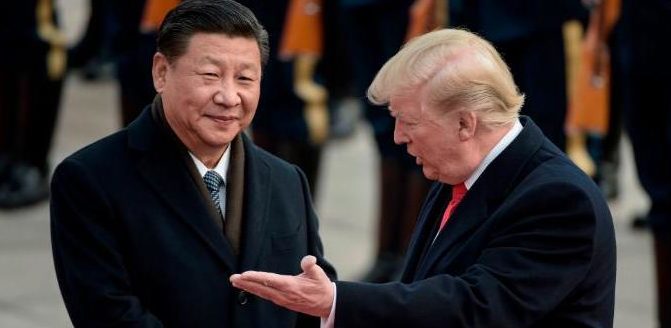Gideon Rachman is the “chief foreign affairs commentator” of the Financial Times. His words are read around the world by an elite audience in business and government. Which is why his latest column — an absolute shocker — does actually matter.
There is, buried within it, a fair point: which is that without an independent international investigation into the origins of the pandemic “the blame game between the US and China is likely to escalate and become more dangerous.” Unfortunately, Rachman presents that “blame game” as if the rival super-powers were on a remotely similar level — “all these angry emotions on both sides”. The reality is that America — and the wider world — has every reason to be angry with the Chinese government.
Rachman thinks he’s being even-handed (as symbolised by the accompanying cartoon, which depicts Donald Trump and Xi Jinping as fingers jabbing at one another), but the equivalence is grotesquely inappropriate. Consider the opening paragraph:
In fact, the American presence in the region is at the invitation of Japan, South Korea, Taiwan etc., which for decades have relied on the US to protect them against hostile neighbours. China, meanwhile, has propped-up North Korea, laid claim to international waters and built its bases on islands over which Chinese sovereignty is disputed by the rest of the world. That is more than a challenge to American power — it’s expansionism. As for the recent trade war, it was not “initiated” by the Americans, but rather, they finally lost patience with China’s blatant mercantilism.
The lopsided juxtapositions continue throughout the article. Yes, Donald Trump has handled the Covid-crisis with all the grace and good sense we’ve come to expect from him (i.e. very little), but his absurd public statements, while unbefitting of his office, are trivial compared to what the Chinese government has done to obscure the truth about the epidemic.
Then there’s the matter of what Rachman calls “xenophobia”, where the ultra-nationalistic propaganda campaigns of a totalitarian state (that’s the PRC, by the way) is set alongside the bigoted words and actions of a small number of American individuals.
If you don’t understand the world of difference here — then ask the Tibetans, or the Uighurs, or the people of Hong Kong, or China’s brave independent journalists.











Join the discussion
Join like minded readers that support our journalism by becoming a paid subscriber
To join the discussion in the comments, become a paid subscriber.
Join like minded readers that support our journalism, read unlimited articles and enjoy other subscriber-only benefits.
Subscribe